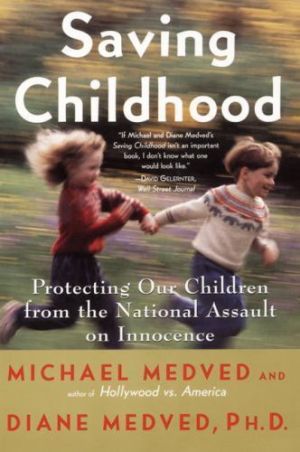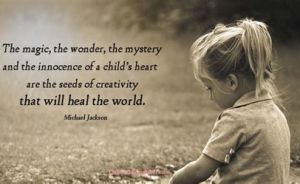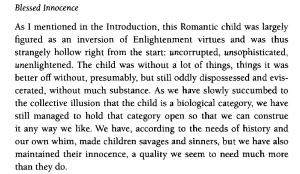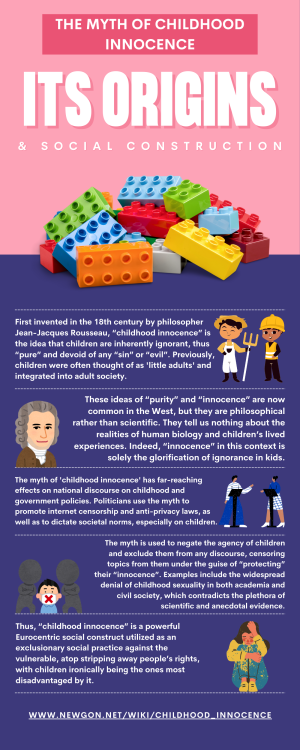One of our staff members is contributing considerably to a News Archiving service at Mu. Any well educated (Masters, PhD or above) users who wish to make comments on news sites, please contact Jim Burton directly rather than using this list, and we can work on maximising view count.
Childhood Innocence


Childhood Innocence, as our debate article (with further excerpts) explains, is a subjective and culturally unstable concept in Western society, whereby naivety and ignorance in children is idolized in some way. "Childhood innocence", a relatively recent invention[1] is historically associated with romanticists such as Rousseau, and more recently as a trope and cause célèbre within regressive politics, particularly of the conservative variety. Conservative and regressive liberal politics, including "radical" feminism has tended towards sexualizing/eroticizing those qualities in children which it deems to be "innocence", defining outside influences as "corrupting", "perverse" and "degenerate". It is in this sense that the "child" and its "innocence" plays a functional role in the perpetuation of a status-quo, and in service of Zeitgeist state and corporate institutions.
Quotes from authors attempting to define or reify innocence
Imaginative Conservative:
Everyone has witnessed this childhood innocence. The child exhibits this marveling spirit with great exuberance toward the good, true and beautiful and a rejection of the contrary. During early childhood, the boy develops his first certainties. He will be full of admiration, trust and hope that comes from the joy of new life. All these things develop inside this wonderworld of childhood innocence. However, this splendid gift must be protected against evil, sin and deception. With an underdeveloped intelligence, the young boy lacks the understanding of these elements that invade his marvelous world. As he grows older, he will develop new criteria and find ways of combatting evil without breaking his internal harmony.[2]
Tim Lott for The Guardian:
Innocence goes deeper than ignorance. It is some mysterious operation of the imagination, the part that can enter into mental universes from which one is soon to be forever excluded. I have my own particular recollection of this. Every year from when I was of reading age, I was given a Rupert the Bear annual for Christmas and every Christmas day I fell upon it with a passion, losing myself in the mysterious tales of Chinese wizards and sea-gods and wood sprites. Then one year I picked up the annual and could not "get into it". It was just a book with pictures and a story. I could no longer enter its portal and inhabit its world.[3]
Authors who critique innocence


David Evans, Danielle Egan, Gail Hawkes, Anne Higonnet,[4] Linda Gordon,[5] Kathryn Bond Stockton,[6] Kerry Robinson, Erin J. Rand,[7] Hannah Dyer,[8][9] Mary Zaborskis, Alisha Nguyen, Jenny Kitzinger,[10] Julie Garlen,[11] John Holt and James Kincaid have all attempted to critique the concept of innocence.
Jules Gill-Peterson:
Children, as images or a set of ideas, serve the purpose of making the future the same as the past. The child is used to literalize the idea of reproduction at the scale of the entire world, so that things like the Family, the Nation, the Race, and the Economy don’t fall apart or even change too much. It’s why we spend so much anxious time trying to make children all the things we’re told are actually natural and inborn. It’s one of the most ridiculous paradoxes you can find in everyday life.
Look at children’s sexuality, for instance, which has to form and grow even as kids are supposed to be asexual, which means that our culture is structurally pedophilic, taking an erotic interest in children’s purity. It also means that children’s sexuality is so fragile that a gay character on a cartoon, or too much sex education, might ruin the institution of marriage and even the institution of heterosexuality itself. It’s why there’s a whole subreddit now populated by teenaged boys convinced that their lives have been ruined by their addiction to porn and that, if only they stop masturbating, they’ll become powerful and desired supermen.
This paradox goes for bodies and gender too, which are supposed to be derived out of genetics and brains formed by infancy and yet are so precarious that it’s okay for people to openly hate and try to kill queer and trans kids to purify the population of its deviants. It’s also a paradox of race, in one of the worst versions of all, which isn’t even supposed to be biological but nevertheless guarantees that the spoils of white supremacy and empire won’t be threatened because a twelve-year-old Black boy can be shot on camera and half the country likes watching it.
The point is, no one has to admit any of these secret truths. They’re open secrets. That idea, that figure of “the child”—won’t somebody please think of the children!, screams Maude Flanders—guarantees that all this gross violence needed to maintain the status quo can pass itself off as innocent. As innocent as the cherubic white child who must be protected from the terrible sins of the world. It’s just, she’s actually not a real child, she’s the alibi for those sins.[12]
Clive Erricker:
Anne Higonnet’s study Pictures of Innocence: the history and crisis of ideal childhood (1998) is concerned with these issues. She speaks of the Romantic construction of childhood and the ‘knowing’ child. She records how the Romantic concept spread through the arts from the 1770s, through the depictions of artists of elite society such as Joshua Reynolds, until it reached a far broader audience by the mid-nineteenth century with the newly-monied middle classes. Her conclusion is that the concept of Romantic innocence ‘puts all children at a kind of risk’. Its appeal ran parallel to claims to cherish and protect childhood but, and here she refers to James Kinkaid’s[sic] thesis, ‘If childhood is understood as a blank slate, then adults can freely project their fantasies onto children, whatever those fantasies may be’ (Kincaid, 1996, p. 211). In other words the portrayal of children as innocent effectively ensures the right to a certain control and power over them because adults are their protectors.[13]
Works that address the innocence trope
- James Kincaid: Erotic Innocence: The Culture of Child Molesting (Duke University Press, 1998). See also our article on the subject.
- David Evans: Falling angels? - the material construction of children as sexual citizens.
- Essay:The Paradigm of Innocence
See also
External links
- Children Are Innocent - TVTropes
- Alba M.: Childhood innocence is an adult fantasy. From the publication Out of the pen of babes. Radical thoughts on the oppression of children and on youth liberation.
- Thomas O'Carroll, Childhood ‘Innocence’ is Not Ideal: Virtue Ethics and Child–Adult Sex. Sexuality & Culture 22, 1230–1262 (2018).
References
- ↑ The invention of childhood innocence - Harvard Gazette
- ↑ How Childhood Innocence Strikes Terror Into Drag Queens - Imaginative Conservative
- ↑ What exactly is the innocence of childhood? - Tim Lott
- ↑ Pictures of innocence: the history and crisis of ideal childhood - Anne Higonnet (1998)
- ↑ Linda Gordon. (2008). The Perils of Innocence, or What’s Wrong with Putting Children First. The Journal of the History of Childhood and Youth, 1(3), 331–350. doi:10.1353/hcy.0.0021 Childhood Innocence and the Racialized Child in a White Space
- ↑ Kathryn Bond Stockton, The Queer Child, or Growing Sideways in the Twentieth Century (Duke University Press: Durham, 2009).
- ↑ Erin J. Rand. (2019). PROTECTing the figure of innocence: child pornography legislation and the queerness of childhood. Quarterly Journal of Speech, 105(3), 251–272.
- ↑ Hannah Dyer, Queer futurity and childhood innocence: Beyond the injury of development, in Global Childhood Studies, (2016).
- ↑ Hannah Dyer, The Queer Aesthetics of Childhood: Asymmetries of Innocence and the Cultural Politics of Child Development (2020, Rutgers University Press).
- ↑ Kitzinger, J. (1988). Defending Innocence: Ideologies of Childhood. Feminist Review, (28), 77.
- ↑ Garlen, J. C. (2018). Interrogating innocence: “Childhood” as exclusionary social practice. Childhood, 090756821881148. doi:10.1177/0907568218811484
- ↑ The Miseducation of a French Feminist, by Jules Gill-Peterson
- ↑ Clive Erricker (2003) Against the Protection of Childhood Innocence, International Journal of Children's Spirituality, 8:1, 3-7, DOI: 10.1080/13644360304640